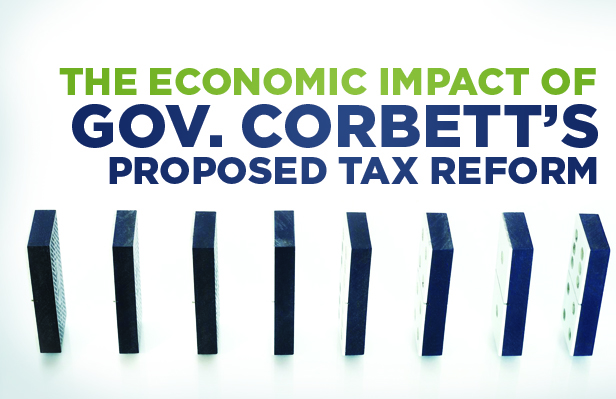Commentary

The Case for Corbett’s Tax Reform
Pennsylvania’s small business owners face a daunting challenge: How can you invest and expand your business while paying the second highest corporate tax rate in the country? If you can believe it, combined with the federal tax rate, Pennsylvania businesses pay the second highest tax on their profits in the entire industrialized world.
And the sluggish economy isn’t making things any easier. The good news is that Governor Corbett has proposed tax reform to alleviate some of this burden and make Pennsylvania more competitive. This reform plan will boost the economy—growing jobs and raising personal income across the state.
A new analysis sponsored by the Commonwealth Foundation and conducted by economists at the Beacon Hill Institute demonstrates exactly how the Governor’s tax reform plan will put Pennsylvania on the path to prosperity. Specifically, the plan examines the Governor’s call for reducing the state’s corporate income tax.
The report finds that if these reforms pass this year, the state would see over one billion dollars in additional business investment by 2018. More investment means more jobs. The analysis concludes that more than 1,200 additional private sector jobs would be created in five years as a direct result of these tax reforms. And as investment grows in future years, job growth would accelerate.
Increased employment and investment also lead to wider benefits for families. Based on our projections, Pennsylvania’s real disposable income would grow by $460 million as a direct result of business tax reform.
This is a real stimulus. Businesses would be able to invest more and expand their operations, in turn creating additional tax revenue and more jobs and income for the working Pennsylvanians who have suffered in recent years.
Given these benefits, tax reform is a no-brainer. That’s why Pennsylvania isn’t alone in pursuing this path. This year, Louisiana, Nebraska, Kansas, and North Carolina have all considered comprehensive tax reform, with each state taking a slightly different approach. Moreover, in recent years, other states of varying political persuasion—ranging from Washington to Texas to Ohio—have also taken proactive steps to improve their economies by reducing or eliminating onerous corporate income taxes.
The timing couldn’t be better. Pennsylvania consistently lags the nation in job and income growth. Contrary to its nickname, the Keystone State ranks among the 10 worst states for businesses, according to a survey of business leaders by CEO Magazine, and 39th in state competitiveness, according to the Beacon Hill Institute.
Unfortunately, some fail to see the benefits of tax reform and suggest we hold off on cutting tax rates. Due to lower than expected tax revenue collections for the state this year, some lawmakers are calling for higher taxes to “invest” in their own spending priorities. Others suggest we need to increase tax credit programs—that benefit some businesses, but not all—to make it easier for businesses to compete in Pennsylvania.
If creating jobs is our top priority, these ideas need to be scrapped in favor of broad tax relief. Tax increases impede economic growth, while tax relief unleashes it. Ending targeted tax breaks and corporate welfare programs would allow Pennsylvania to lower its tax rate for everyone. To realize these economic benefits even more quickly, lawmakers in Harrisburg should look to accelerate the Governor’s tax reductions.
At a time of heightened partisan bickering, sensible reforms like this are worth pursuing, especially when the benefits are so clear. Tax reform will give Pennsylvania a competitive edge over its neighbors while encouraging business investment and job growth.
# # #
Nathan A. Benefield is director of policy analysis with the Commonwealth Foundation (CommonwealthFoundation.org).